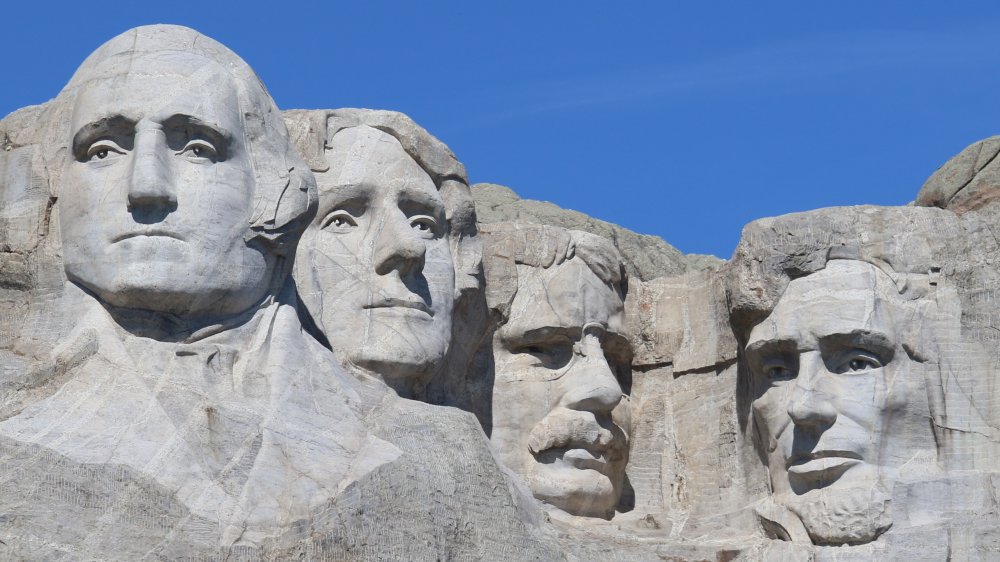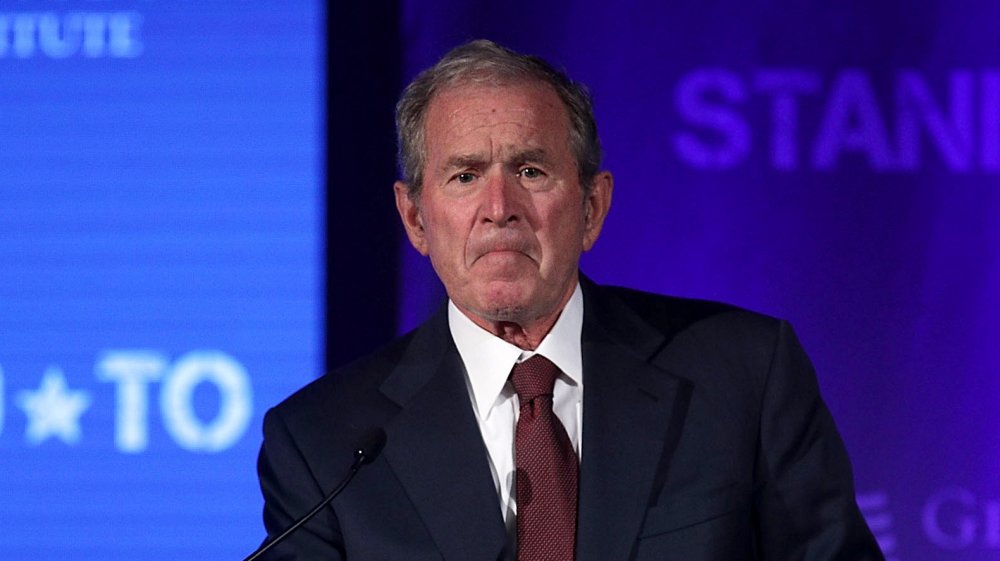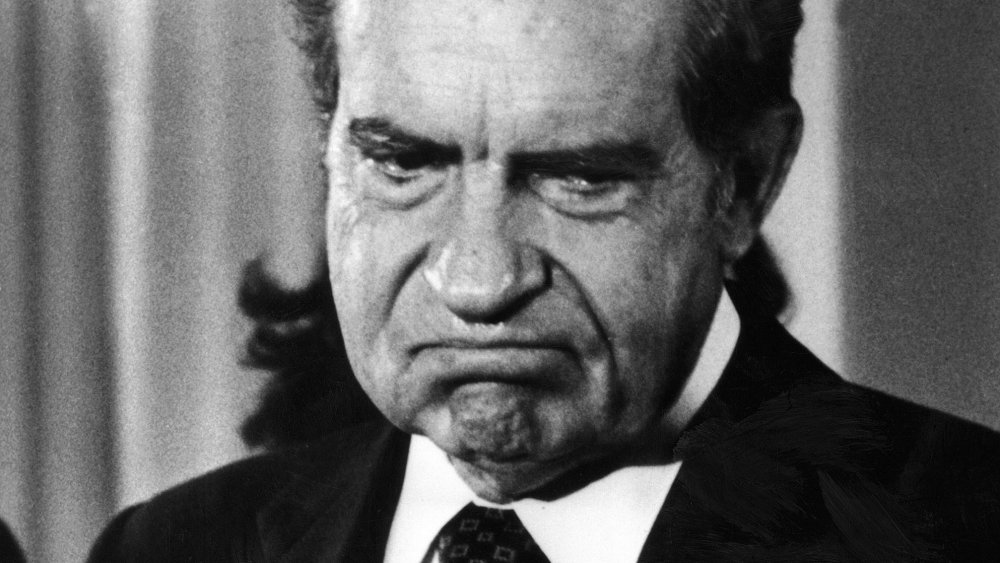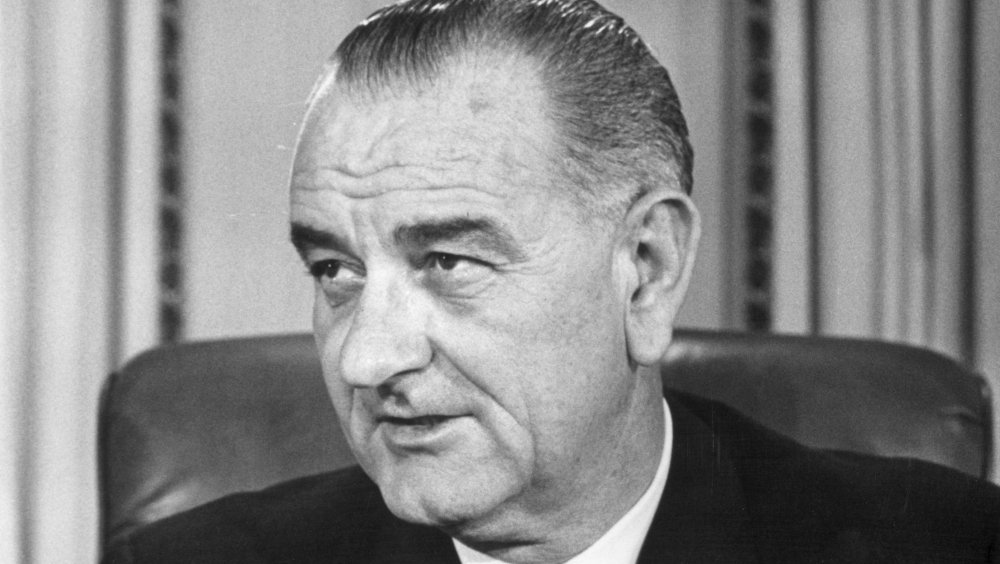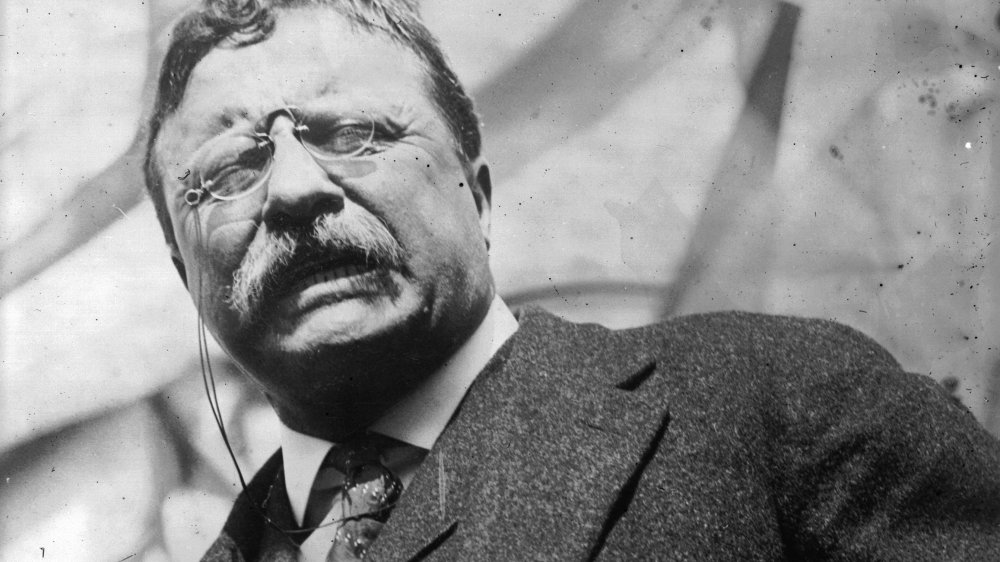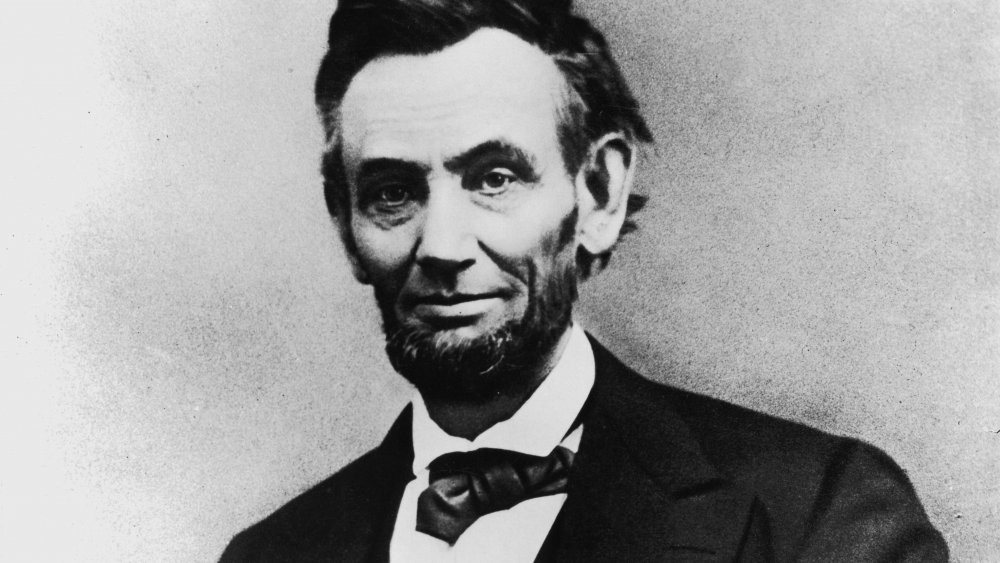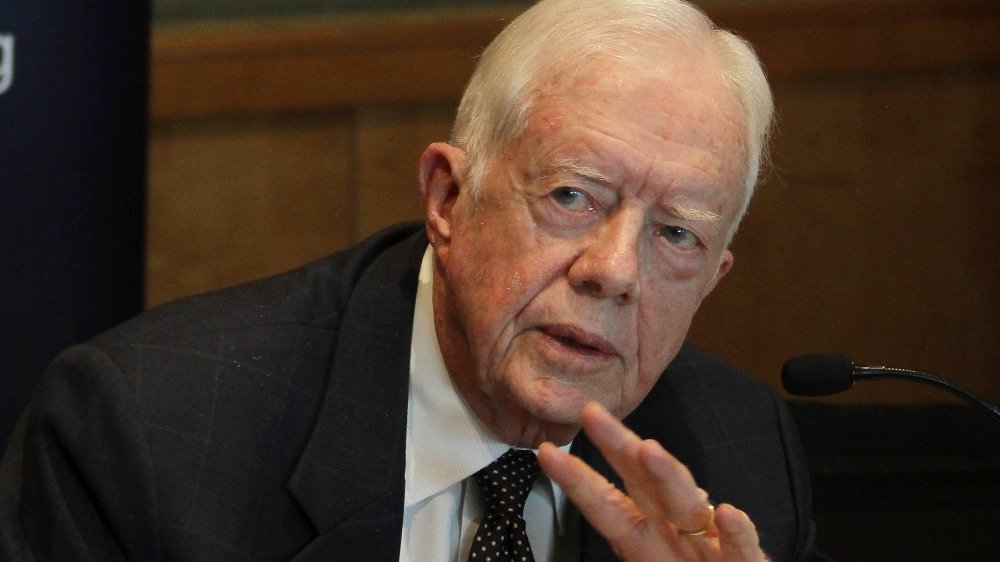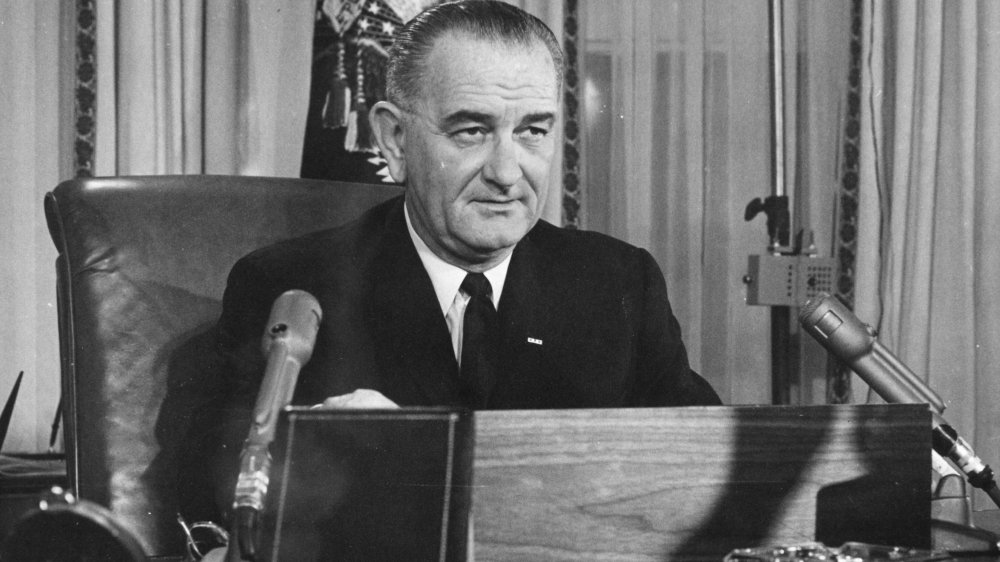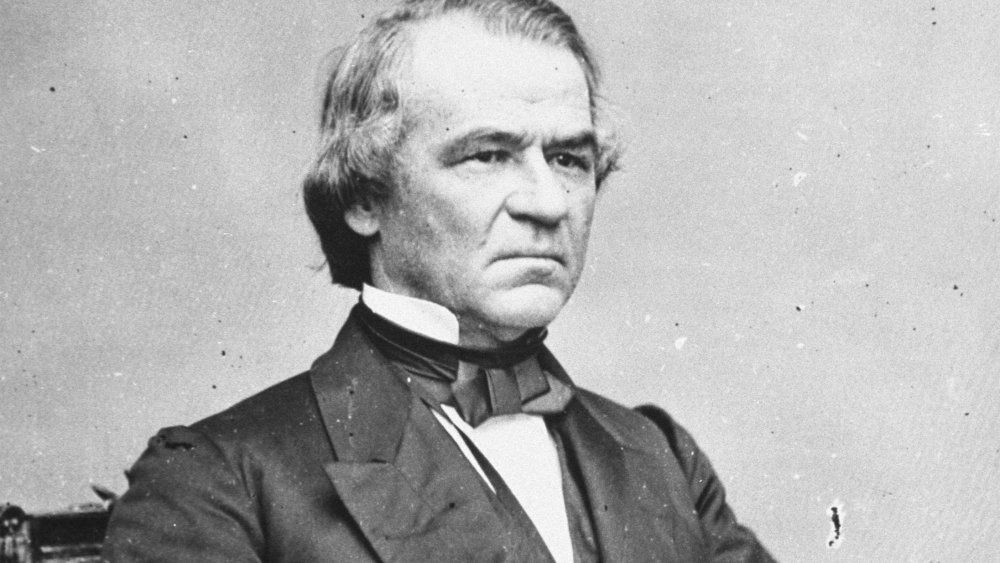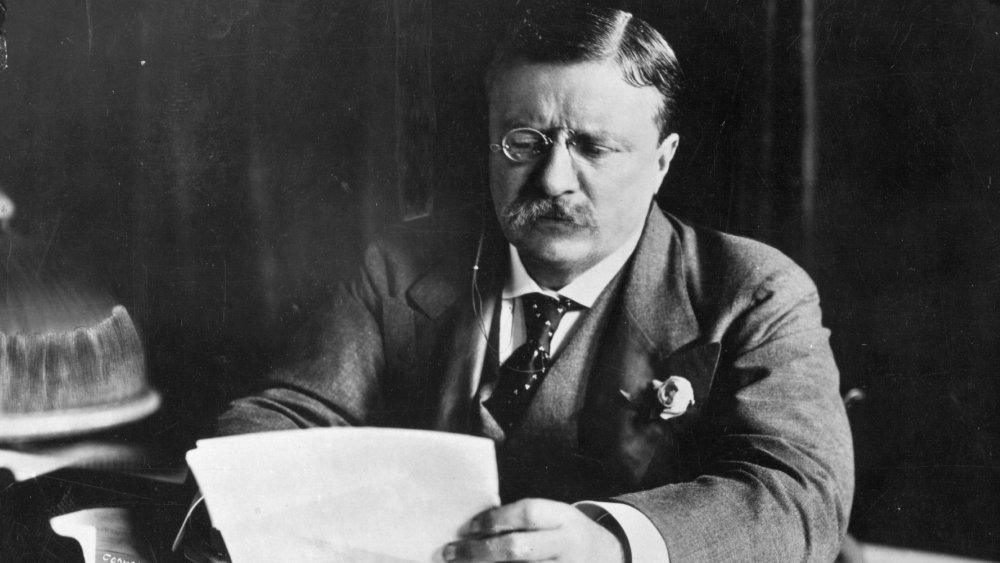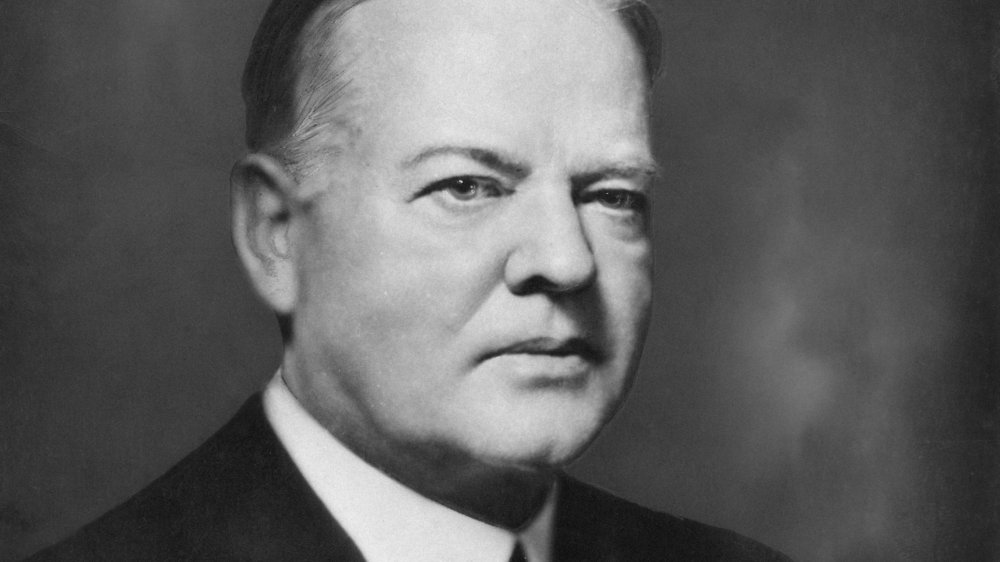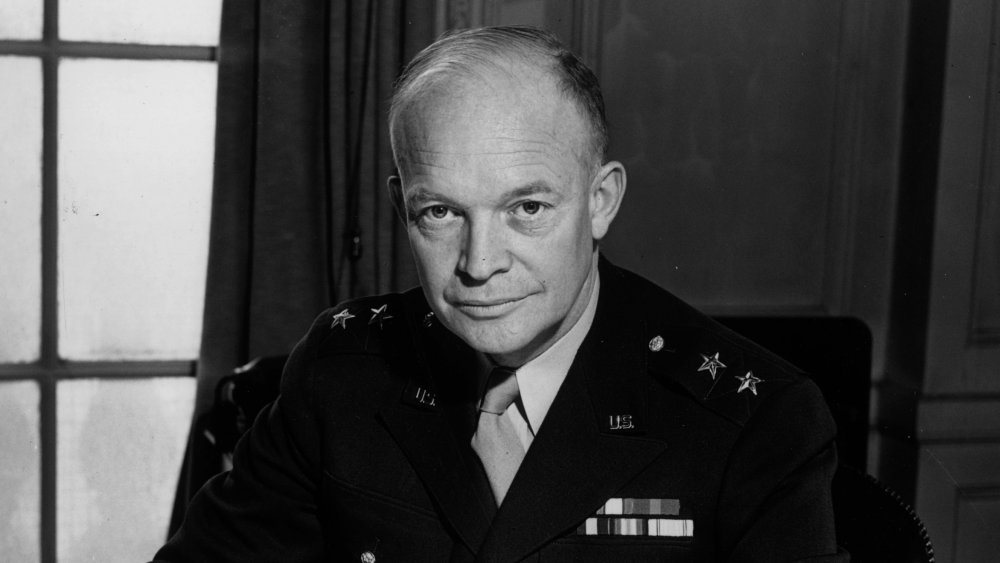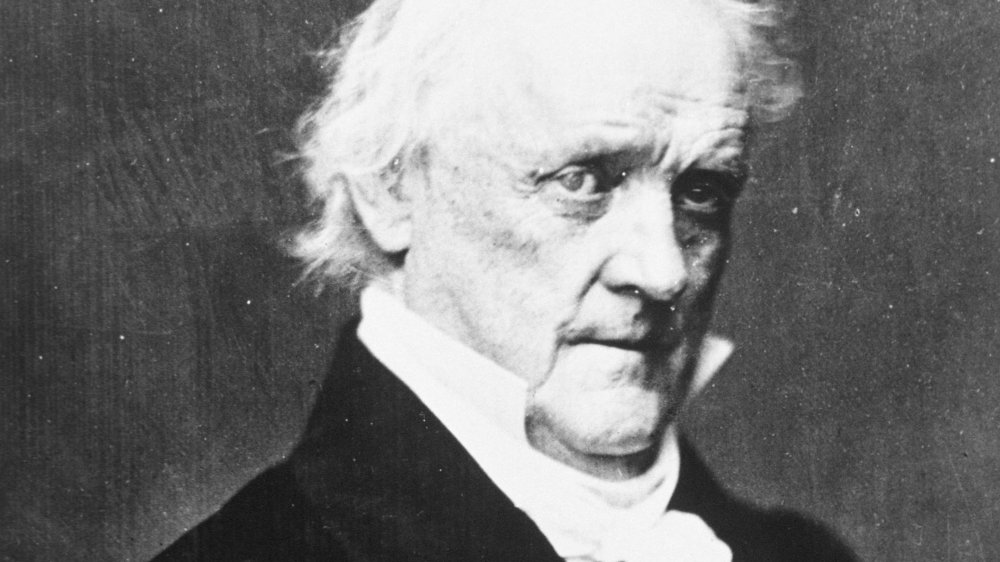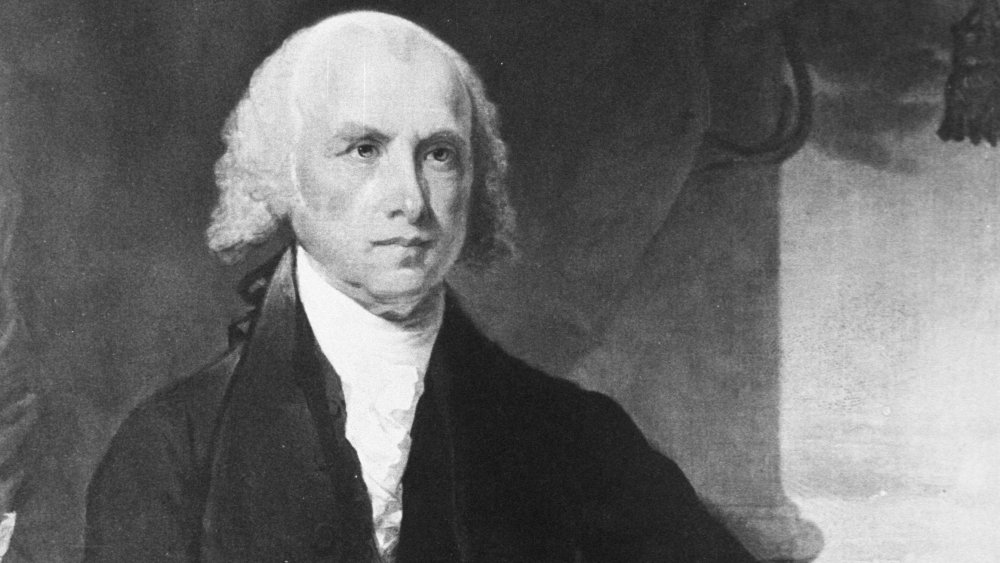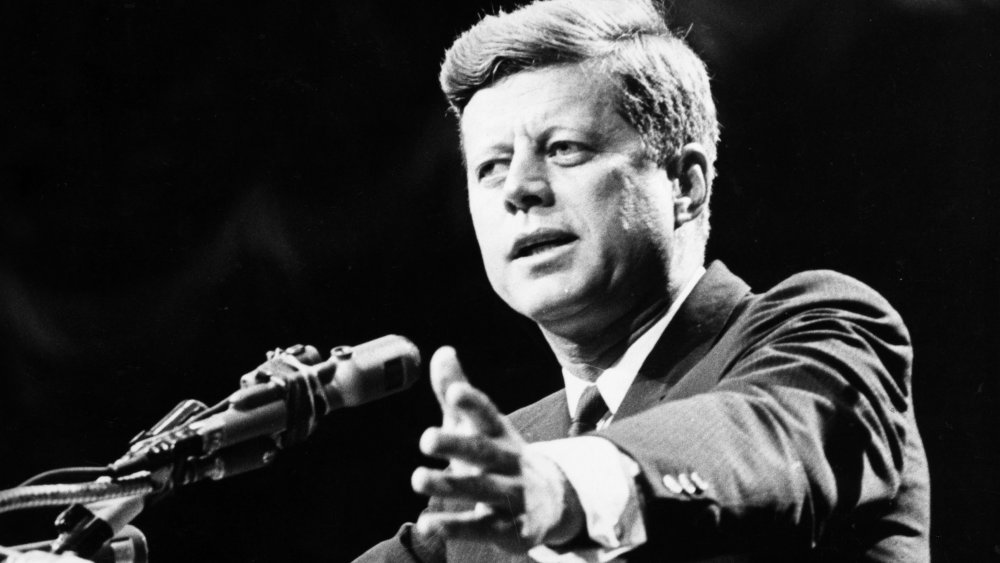The Best And Worst Advice Presidents Have Given The USA
Presidents of the United States have collectively given thousands of addresses and public speeches. Some have had teams of writers penning their powerful words while others have improvised amazing prose. Their advice has the ability to move hearts, change policy, and sway votes. The majority of the time presidents speak to the nation, the talks are decent speeches meant to raise morale or make the public feel good about handing over the reins of the USA to the presidential newcomer. Though on occasion, their words are meant to carry more weight and their advice pulls to one end of the spectrum or the other: sage or catastrophic.
Saying what advice is best or worst is really down to personal opinion, but there are some examples that are so obvious, you'd think few could disagree. And it doesn't mean a president was overall bad or great, especially since sometimes different speeches by the same man fell into both categories. This is the best and worst advice presidents have given the USA.
Best: George W. Bush calls for an end to racist attacks following 9/11
Immediately following the terrorist attacks on September 11, 2001, the rate of racially motivated violence against Muslims skyrocketed in the United States. People were attacked for wearing traditional Islamic attire, going outside with their heads covered by a hijab or other headdress, or simply for having brown skin. The racial attacks weren't always against Muslims either. Anyone who looked vaguely Middle Eastern was a probable target. Naturally, people were scared to leave their homes.
The problem became so profound so quickly that President George W. Bush addressed racist attacks in a speech only six days after the 9/11 attacks, stating, "Islam is peace," and that the perpetrators of terrorist attacks didn't represent peace or Islam. Bush goes on to discuss how Islam brings "comfort and solace" to billions of people and how valuable Muslims are to the US. He talks about how they participate in a wide range of necessary professions, and he states that they "need to be treated with respect."
"Those who feel like they can intimidate our fellow citizens to take out their anger don't represent the best of America, they represent the worst of humankind, and they should be ashamed of that kind of behavior," Bush says. By taking a firm stance against the violence and intimidation, he advises the country to do the same.
Worst: Richard Nixon said plenty of horrible things
After the Watergate scandal, and certainly following the release of the Nixon tapes, it's doubtful that anyone is shocked about Richard Nixon making the "worst advice" list. And it's a good thing we're only counting advice to the country, because he gave some downright immoral advice to an unnamed political associate, according to The Washington Post, by saying "You don't know how to lie. If you can't lie you'll never go anywhere." But that pales compared to when he tried to to set a dangerous precedent for the nation.
During an interview with David Frost in 1977, Nixon says that if the president orders something, that makes it legal by definition. This advice says to the nation that the president is allowed to do whatever they want without legal repercussions, which would make the entire system of checks and balances completely worthless. Granting the president absolute power over the nation would be pretty convenient for said president and pretty terrifying for everyone else.
Best: Lyndon B. Johnson pushes us towards a 'Great Society'
Lyndon B. Johnson had said his fair share of disgusting things, often dropping the N-word and being outright racist in other ways, but that doesn't mean he never gave great advice to the nation. Even people with horrible views can say something touching and meaningful once in a while.
During a speech at the commencement for University of Michigan graduates in 1964, according to History, Johnson told the nation that they had an opportunity "to move not only toward the rich society and the powerful society, but upward to the Great Society." How does the 36th president advise we do this? By building a society that uses progress to serve the needs of the people, uses wealth "to enrich and elevate our national life," and avoids being buried beneath "unbridled growth." The advice focuses on us using wealth and progress as a society to improve communities instead of falling into a "winners" mentality where having more becomes the end goal.
Worst: Teddy Roosevelt pushes for eugenics
Teddy Roosevelt was progressive for his time as far as African-American rights and women's rights were concerned, but he didn't seem to have the same forward-thinking convictions when it came to those who weren't able-bodied or who were criminals. In fact, his feelings regarding rights for "the wrong people" went in the complete opposite direction.
According to Gizmodo, the 26th president of the United States and first American to be awarded the Nobel Peace Prize once gave this horrific advice advocating for eugenics: "I wish very much that the wrong people could be prevented entirely from breeding; and when the evil nature of these people is sufficiently flagrant, this should be done. Criminals should be sterilized and feeble-minded persons forbidden to leave offspring behind them."
The advice posed by Roosevelt, if followed, would strip people of their natural right to procreate, causing undue harm to people considered to be less intelligent, anyone who wasn't able-bodied, and people who had broken the law. Eugenics is never good advice.
Best: Lincoln's Gettysburg Address included a call to action
Lincoln's Gettysburg address is probably the most famous presidential speech ever. Most people know this iconic speech from the opening line: "Fourscore and seven years ago our fathers brought forth on this continent a new nation, conceived in liberty and dedicated to the proposition that all men are created equal." But the speech goes much further and calls the people of the nation to action.
The majority of the address discusses the Civil War, the deeds of the men who gave their lives in the war, and the cause for which they did so: to end slavery. Lincoln uses these points as a call to action, saying that the nation needs to be dedicated "to the unfinished work" of these unnamed heroes. He tells the people there's a "great task" ahead of them, and they need to make sure the dead hadn't "died in vain."
Lincoln knew the Civil War wouldn't be the end of the struggle against slavery and was only the first step. From there, it would be up to the people to make sure the work was finished.
Worst: Jimmy Carter turns speech on the energy crisis into a blame game
When it comes to speeches, few are on the level of President Jimmy Carter's national address from July 15, 1979, and not in a good way. The speech was so famously bad it went down in history as the "malaise" speech. The speech was poorly delivered, riddled with rhetorical inconsistencies, and gave some pretty bad advice to a nation that was facing an energy crisis. In fact, the speech didn't even address the energy crisis (its sole purpose) until progressing past its 2,000th word. According to The Star, this was "the worst speech of all time." And, the advice it gave wasn't much better.
Carter's address offered no solutions to the energy crisis at hand and criticized the average people of the country while only indirectly touching on Carter's role in the whole thing. It wasn't until the last paragraph of the speech that Carter offers any advice on the situation and, even then, it was to "face the truth" and "have faith in each other, faith in our ability to govern ourselves, and faith in the future of this nation." But faith won't keep the lights on.
Best: LBJ on equality following Bloody Sunday
Bloody Sunday was the result of racist violence towards peaceful protesters who were attempting to march from Selma to Montgomery, Alabama as a demonstration in the fight for black voting rights. Dozens of protesters were injured and 17 were hospitalized, including a future congressman, by police who were trying to stop the march, according to CNN.
One week after Bloody Sunday, LBJ gave a speech on the Voting Rights Act that sat before Congress. In the speech, he claimed segregation and racism were only "an American problem." He goes on to quote past presidents as a way of implying this nation was founded on equality and fought a civil war to keep it that way. He throws his support behind the Civil Rights Act and advises the country to do the same by telling the nation that all of its citizens deserve to "share in the dignity of man," be treated as equal, choose their leaders (vote), be educated, and "provide for [their] family."
Worst: Vice President Andrew Johnson took over after Lincoln's death, but he was no Lincoln
Due to Abraham Lincoln's assassination, then Vice President Andrew Johnson was given a shot at running the United States. This would prove to be a poor decision for the county as Johnson would be the first president in US history to be impeached, according to History. Throughout the Civil War, Johnson supported the Union and opposed slavery, but he didn't support equal rights for freed slaves. He went so far as to veto two bills meant to protect former slaves after they were freed.
Before his impeachment, Johnson ran the "a swing around the circle" campaign, as it was popularly named, in an attempt to get people behind less-than-fair reconstruction policies. On this tour of persuasion, Johnson would say things like, "The blacks of the South are ... so utterly ignorant of public affairs that their voting can consist in nothing more than carrying a ballot to the place where they are directed to deposit it." It's pretty obvious that advice like this was meant to keep black Americans being treated as second class citizens. Not cool, Johnson.
Best: Theodore Roosevelt warns us about following a leader just because he's in charge
Theodore Roosevelt has a famous quote floating around that can be useful advice in several different situations. The essence of the quote tells us not to follow a leader just because they're in charge. Sometimes generals make a poor decision and soldiers die. There are CEOs who have run entire companies into the ground. The quote speaks to how positions of authority are often seen by normal folks as some sort of power that can't be argued against and when a person in such a position demands that they must be followed solely due to their position, it's not only an abuse of power but morally reprehensible as well.
When Roosevelt spoke the lines, he did so with the president in mind, saying: "To announce that there must be no criticism of the President, or that we are to stand by the President, right or wrong, is not only unpatriotic and servile, but is morally treasonable to the American public."
Worst: Hoover advised the people to have faith in the economy while they starved
Herbert Hoover had the unfortunate luck of serving as president during the Great Depression, which clearly wasn't helped by his firm belief that no one should get "handouts" in the form of direct government aid. According to Lumen Learning, he called on American businesses to voluntarily help and wanted American workers to "tighten their belts." But, as people were starving and the economy was continuing to plummet, the country required a response from their president.
Pretty much immediately after the stock market collapse of 1929, known as Black Tuesday, Hoover finally gave the people a response when he announced, "Any lack of confidence in the economic future or the strength of business in the United States is foolish." Unfortunately, a statement advising faith in the economy didn't secure jobs for the unemployed and didn't feed the hungry.
Hoover would go one to make more statements of this same dismissive nature. In 1930, he'd announce, "The worst is behind us." The following year, he'd pledge aide under the condition that he had to see that people were starving. Of course, he claimed to have yet to see it.
Best: Dwight Eisenhower warns about the power of the military-industrial complex
Dwight Eisenhower was the 34th president of the United States, a five-star general in WWII, and the man who coined the term "military-industrial complex." The term refers to the informal connection between the military and the armament producers that supply it. A term for that hadn't been needed before the world wars which led to a boom in military spending and reliance on the companies that manufactured the tools of war.
It was in Eisenhower's farewell address that he warns the nation about the influence of this industry over democracy, saying: "In the councils of government, we must guard against the acquisition of unwarranted influence, whether sought or unsought, by the military-industrial complex."
He goes on to explain that the potential for misplacing the power of such a complex will always exist and that we need to safeguard our democracy from being controlled bu the war industry.
Worst: James Buchanan instigates the Civil War
James Buchanan came into his presidency right before the Panic of 1857 sent the country into a financial crisis and when the nation was on the brink of civil war. Buchanan being a slavery sympathizer didn't help the tensions at all and, according to the National Museum of American History, historians believe it actually helped push the nation into the Civil War.
One of his blunders included his response to states that were actively threatening to secede: "The injured States, after having first used all peaceful and constitutional means to obtain redress, would be justified in revolutionary resistance to the Government of the Union."
To be perfectly clear, Buchanan was president of the United States at the time, which meant he was president of the Union from which he was advising these irritated states to secede. It's pretty easy to believe he didn't have many fans left by the time he left office.
Best: James Madison's often misinterpreted quote on knowledge
There's a famous quote from the 4th president of the United States, James Madison, that is often used fragmented and out of context by government officials to justify their need to gather intelligence. The partial quote goes as such: "Knowledge will forever govern ignorance." When read like that and attributed to a Founding Father, it's easy for an official to claim that without gathering intel, a nation is at risk of being governed by an outside force. From there, it's not much of a leap to "the end justifies the means."
The whole quote actually reads like this: "Knowledge will forever govern ignorance, and a people who mean to be their own governors, must arm themselves with the power knowledge gives. A popular government without popular information or the means of acquiring it, is but a prologue to a farce, or a tragedy, or perhaps both."
According to The Atlantic, the quote was written by Madison in support for a piece of education legislation and implied that the people had to be educated on the structures of government to avoid being duped by those running it. In case you're confused about the terminology here, "popular government" refers to a government created by the consent of the people, while "popular information" refers to information available to the people.
Best: John F. Kennedy's famous inaugural speech
Almost all of us know one famous line from John F. Kennedy's inaugural speech. It's this one: "Ask not what your country can do for you — ask what you can do for your country." And, that line is often used to invoke a sense of blind patriotism ... which doesn't make perfect sense if you know the following two lines.
In the less quoted section, Kennedy goes on to tell the people to work towards the freedom of mankind as citizens of Earth: "My fellow citizens of the world: ask not what America will do for you, but what together we can do for the freedom of man. Finally, whether you are citizens of America or citizens of the world, ask of us here the same high standards of strength and sacrifice which we ask of you."
By reading further you realize the advice that Kennedy is giving isn't a message of blind patriotism, but one of conducting ourselves in such a way that we can act in the interest of all mankind as world citizens.
